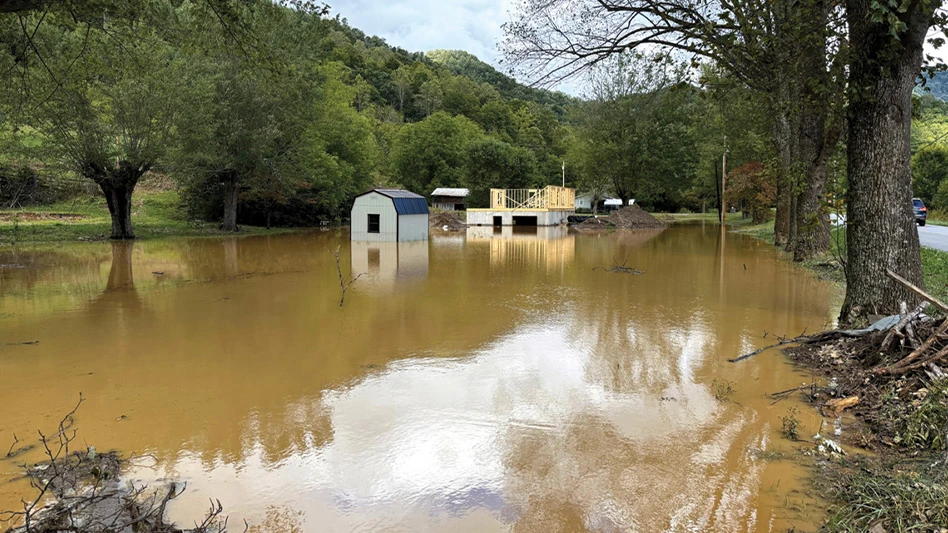
It can be argued that water is a superintendent’s most important resource. Without it, he is left virtually unarmed in his fight against forces that can wreak havoc on the turf he is tending to.
Water, though, can be a precious commodity. That’s particularly the case in California, which has been plagued by drought conditions in recent years.
Justin Mandon is the superintendent at Pasatiempo Golf Club in Santa Cruz, Calif., on the Monterey Bay, less than an hour’s drive north of Pebble Beach and Cypress Point. He was a featured presenter at the recent New Jersey Green Expo, where he spoke on the topic of water management.
A graduate of the two-year turf-management program at Rutgers, Mandon spent seven-and-a-half years at the Olympic Club before coming to Pasatiempo in March of 2013.
Pasatiempo dates to 1929. Its golf course was designed by Alister MacKenzie. If Augusta National was Mackenzie’s masterpiece, then his heart was at Pasatiempo. It was Mackenzie’s home and his ashes were scattered on the property following his death in January of 1934.
“I’m extremely fortunate to be the caretaker there,” Mandon says. “There’s not a day that I go through that front gate that I don’t really want to be there.”
Mandon spends a lot of time dealing with water issues. Pasatiempo receives just 30 inches of rain per year on average. The first rain typically occurs between Halloween and Thanksgiving, as was the case in 2018. Steady rains continue through the winter months before tapering off in April. It’s common for the club to go 200 days without measurable precipitation.
“Your ability to manage irrigation on a golf course becomes extremely crucial when you don’t have your summertime thunderstorms to come through and even out your property,” Mandon says.
Planning ahead
On April 15, 2014, Mandon was dealing with what would turn out to be the worst drought in California history. The golf course had received just seven inches of rain in the past 18 months and drought restrictions were in place. That day, he received a phone call from the city of Santa Cruz informing him his water allocation was being cut by 50 percent, effective in 14 days.
Mandon notes it’s important for a superintendent to have a plan in place for dealing with a drought emergency. “You have to know what your drought stages are,” he says, “and you have to know exactly where you’re going to cut back to meet your drought restriction.”
Mandon had the advantage of a new irrigation system that the club installed in 2010. In the process, 25 acres of irrigated turf were eliminated (today the club irrigates 66 acres).
But further action was necessary. In June of 2014, Mandon eliminated 50 to 75 yards of irrigated turf on each hole while continuing to irrigate greens and tees. If there was any water remaining from the day’s allocation, it went to the fairways.
While golfers appreciated the fact that their drives carried farther on the turf, their enthusiasm waned over time. By September, much of the Poa annua had died, although bermudagrass remained. Since Pasatiempo is a semiprivate facility, the conditions had an impact on the club’s bottom line. In 2014, the club lost half-a-million dollars in golf course revenue. The following year it lost a quarter-million dollars.
Amidst all this, Mandon and club officials were working to find more water at an affordable price.
Most golf courses in California have four options for obtaining water: potable (drinking) water, surface water/runoff from rain events, groundwater and recycled water.
Potable water is expensive and increasingly scarce, surface water is a rare commodity during a drought, and groundwater access is at long-term risk. In 2015, California Gov. Jerry Brown signed a bill mandating all municipalities regulate their groundwater supplies, including wells, by 2040. There are no assurances of how much groundwater will be available for golf courses. Increasingly superintendents are turning to recycled water. But obtaining rights to that water is no easy feat.
Mandon and Pasatiempo leadership did have one point in their favor. In 1979, a pipeline had been installed between a wastewater treatment facility and the Pacific Ocean 4 1/2 miles away, passing the club en route. The pipeline carried 200 million gallons of secondary treated water each year. There was also a 6-inch pipeline extending from the main line and the club, including a water meter that had gone unused since the project was completed.
The club saw the pipeline as a solution to its water issue, but it took two years of negotiations with 13 separate governmental entities, including the governor’s office, before all the pieces fit. Finally, in the spring of 2016, the club signed an agreement with the city of Scotts Valley, guaranteeing Pasatiempo access to 175,000 gallons of water from the pipeline per day, or 35 million gallons per year, for a period of 30 years.
The cost to the club was $1.6 million, which is being paid over a five-year period; a modest price when one considers that the same amount of potable water would likely cost close to $ 1 million per year today and that figure would likely go up in years to come. Today, the recycled water is the bulk of Pasatiempo’s water supply, supplemented by well water and potable water purchased from the city of Santa Cruz.
To make it all work, the club constructed a water treatment plant and pumping station on site, behind its 13th green, including a 500,000-gallon tank to blend all the water. Today, the club gets 170,000 gallons of irrigation water per day from the facility.
Building the treatment plant was not an insignificant expense for the club. The project cost $9 million. But it was an investment in its future. By taking the steps that it did, the club is guaranteed access a reliable supply of water until 2046, water that would doubtless be desirable to other clubs.
Mandon believes the project essentially assured the club’s survival. “I think if we didn’t end up doing the project, the future of Pasatiempo was really in doubt if we were to go through another drought,” he says. “Securing that water was probably one of the most significant things that’s happened to Pasatiempo in quite some time.”
Reaching superintendents on the other coast
Most New Jersey Turf Expo attendees will never deal with the drought-related issues confronting Mandon at Pasatiempo. But his message resonated with an East Coast audience.
“It was fascinating to hear what (Mandon) is doing,” says Mike Tardogno, the superintendent at Skyway Golf Course in Jersey City, N.J. “I know some other courses that are using recycled water. It’s a good thing. Water is going to be an issue soon.”
Skyway utilizes drainage water from a county park located across the street from the nine-hole facility. “We pump that water into the golf course irrigation barn,” Tardogno says. “The golf course itself recycles water. There are four ponds on the golf course that are all connected so we can pull water from all four ponds before we have to pull city water.”
In his presentation, Mandon stressed the importance of communication and collaboration. He noted that decisions he was involved in concerning water management issues were made in conjunction with the membership.
“You do not want to be the sole person making these decisions,” he says. “You should be consulting with your committees, your boards, your greens committee chairman, your golfers. Make sure this is a group effort, because at the end of the day, when this starts being implemented, you’ll end up finding a lot of members and golfers that are extremely unhappy with it.”
Chris Carson is the longtime superintendent at Echo Lake Country Club, a private club in Westfield, N.J. The state regulates how much water the course can use. But Carson, who is committed to using water efficiently, says he is occasionally permitted to irrigate on course property while nearby residents are restricted from watering their lawns.
“When those situations occur, we have to communicate the economic value, the tax value, the economic impact, if you will, of golf, which is billions of dollars in the state of New Jersey,” Carson says. “We’re trying to keep an asset alive at a minimal condition to keep those businesses running.”
Rick Woefel is a Philadelphia-based writer and frequent GCI contributor.
Latest from Golf Course Industry
- Warming up in Winston-Salem
- Get your workplace recognized
- Troon acquires The Club at Cordillera
- Attention equipment managers!
- Cape Kidnappers looks at 20
- FairWays Foundation grants $25k to Monarchs In the Rough
- Beyond the Page 62: A fond farewell
- Florida’s Vineyards Country Club celebrates North Course reopening





